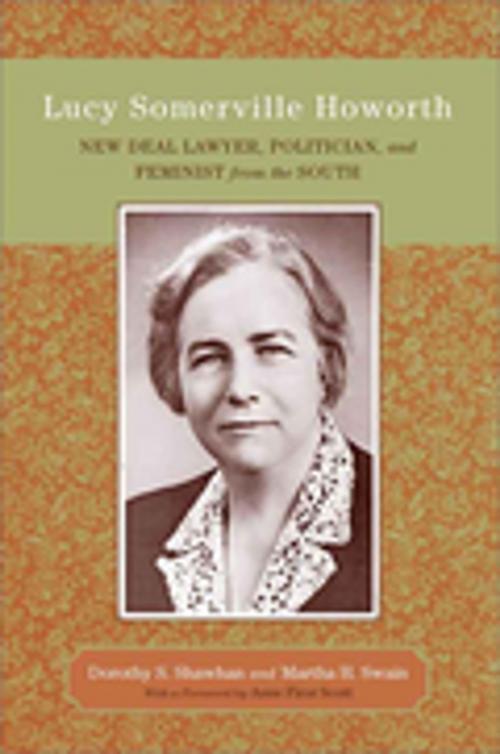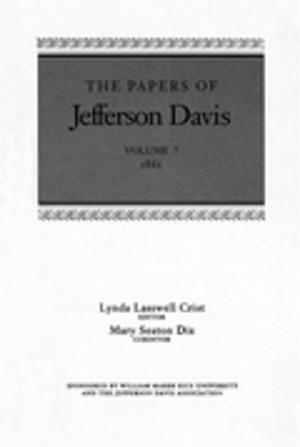Lucy Somerville Howorth
New Deal Lawyer, Politician, and Feminist from the South
Nonfiction, History, Americas, United States, Social & Cultural Studies, Political Science, Biography & Memoir| Author: | Dorothy S. Shawhan, Martha H. Swain | ISBN: | 9780807138779 |
| Publisher: | LSU Press | Publication: | April 6, 2011 |
| Imprint: | LSU Press | Language: | English |
| Author: | Dorothy S. Shawhan, Martha H. Swain |
| ISBN: | 9780807138779 |
| Publisher: | LSU Press |
| Publication: | April 6, 2011 |
| Imprint: | LSU Press |
| Language: | English |
Born, raised, and retired in Mississippi, Lucy Somerville Howorth (1895--1997) was a champion for the rights of women long before feminism emerged as a widely recognized movement. As told by Dorothy S. Shawhan and Martha H. Swain, hers is a remarkable life story-from a small-town upbringing to a career as an attorney, an activist, and the last of a generation of New Deal women in Washington, D.C. She held a presidential appointment under every chief executive from Franklin Roosevelt to John Kennedy.
Howorth was a fervent believer in the power of organizations to bring about change, and she became known for her leadership qualities, acumen, and quick appraisal of social problems, particularly as they affected women. Shawhan and Swain point out that her winsome personality, small stature, and delightful sense of humor also aided her as a female aspiring in a man's world. In 1931 she was elected to the Mississippi House of Representatives and, after campaigning for Roosevelt, was rewarded by the new president with a federal appointment. She served in a number of subsequent roles, rising to become general counsel of the War Claims Commission, at that time the highest legal position in an executive commission ever filled by a woman.
Howorth worked relentlessly for the advancement of women, especially through the American Association for University Women and the National Federation of Business and Professional Women. She lobbied for equality in the workplace, helping to effect significant advances in government and the professions. In 1944, at the request of Eleanor Roosevelt, Howorth delivered the keynote speech at the White House Conference on Women in Postwar Policy-Making, the most memorable of her many public addresses.
This first-ever biography of Howorth bestows long-overdue recognition of her many notable achievements and illuminates the activism of women in the decades often considered to be the doldrums of the women's movement.
Born, raised, and retired in Mississippi, Lucy Somerville Howorth (1895--1997) was a champion for the rights of women long before feminism emerged as a widely recognized movement. As told by Dorothy S. Shawhan and Martha H. Swain, hers is a remarkable life story-from a small-town upbringing to a career as an attorney, an activist, and the last of a generation of New Deal women in Washington, D.C. She held a presidential appointment under every chief executive from Franklin Roosevelt to John Kennedy.
Howorth was a fervent believer in the power of organizations to bring about change, and she became known for her leadership qualities, acumen, and quick appraisal of social problems, particularly as they affected women. Shawhan and Swain point out that her winsome personality, small stature, and delightful sense of humor also aided her as a female aspiring in a man's world. In 1931 she was elected to the Mississippi House of Representatives and, after campaigning for Roosevelt, was rewarded by the new president with a federal appointment. She served in a number of subsequent roles, rising to become general counsel of the War Claims Commission, at that time the highest legal position in an executive commission ever filled by a woman.
Howorth worked relentlessly for the advancement of women, especially through the American Association for University Women and the National Federation of Business and Professional Women. She lobbied for equality in the workplace, helping to effect significant advances in government and the professions. In 1944, at the request of Eleanor Roosevelt, Howorth delivered the keynote speech at the White House Conference on Women in Postwar Policy-Making, the most memorable of her many public addresses.
This first-ever biography of Howorth bestows long-overdue recognition of her many notable achievements and illuminates the activism of women in the decades often considered to be the doldrums of the women's movement.















